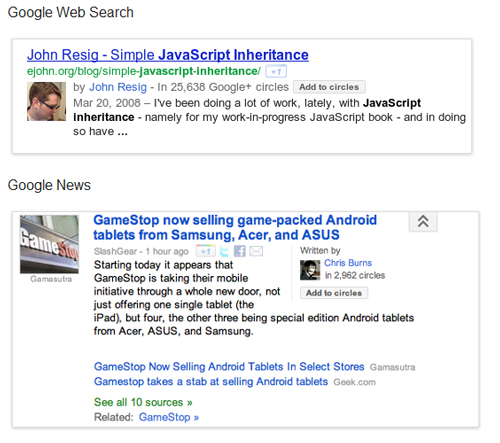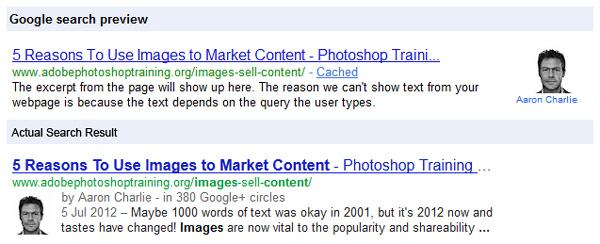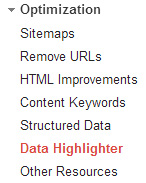UPDATE JULY 2014: Google has now withrawn authorship photos from SERPs. We still recommend implementing authorship as results will still have a byline and your content will rank better for your Google+ connections.
Google have just announced that they are going to start showing author information in search results. This is great for author awareness and can help Google raise the rankings of pages written by authority figures. It is also great for SEO's who are worried that al the great content they are writing is getting ripped off or assigned to the wrong author!
Even better, Google are replacing 'rel=author' and 'rel=me' tags and are instead automatically linking your Google+ profile to content you have written. All you have to do now is add the URLs of the sites you write for to your Google+ profile, and then when scanning those sites, Google will attribute any posts with your author name to you. Then when those posts appear in search results they will come with a 'Written by' box including a link to your G+ page. It should end up looking like this:

So why the need for this new change when Google first announced author tags last year?
Aaron Charlie
13 Jan 2012
Direct traffic in Google Analytics 
During Google Analytics training delegates frequently ask what does direct traffic means? Here's our concise answer to help all beginners - if you're already familiar with Analytics basics you may be interested in our Advanced Google Analytics training in Brighton, Sussex.
We run SEO training and frequently blog on all things SEO e.g. optimising Facebook for Google and do MicroSites work?; do get in touch if there's some SEO information you'd like to see covered.
Aaron Charlie
15 Jun 2010
UPDATE JULY 2014: Google has now withdrawn authorship photos from SERPs. We still recommend implementing authorship as results will still have a byline and your content will rank better for your Google+ connections.

Possible name for Author Rank update in 2013: Shakespeare Panda
Two years ago, after attending a much smaller BrightonSEO, we wrote a post about the death of journalism. Now in 2012, at a much bigger BrightonSEO, James Carson believes it is rising from the grave to take back the internet from anonymous personas.
The importance of authorship on the internet was a hot topic on Friday. As well as James Carson’s excellent 20x20 presentation 'I Believe that Authors are The Future', it also came up in a number of the other talks and prompted some follow up discussion on Twitter and on blogs. Coincidently a blog post on authorship appeared on SEOmoz two days later.
Make sure you've read our other write ups of BrightonSEO including the 'Ask the Engines' panel, morning session, afternoon session and 20x20 talks.
The meat of James’ talk was that authorship will be important for SEO in the future as search engines look to find a suitable replacement for link ranking factors that have become skewed thanks to paid link building, link spam and the ongoing pursuit of SEOs to gain more and higher authority links to boost their rankings. Even social ranking factors aren’t that reliable due to paid followers and shares.
Craig Charley
18 Apr 2012
UPDATE JULY 2014: Google has now withdrawn authorship photos from SERPs. With this in mind it is unlikely that publisher info will start showing. We still recommend implementing authorship & publisher markup as results will still have a byline and your content will rank better for your Google+ connections.
Recently, while testing out some new titles and markup for our Photoshop courses using Google's Rich Snippet Testing Tool, I was surprised to notice a new addition to the preview:

This will be a familiar sight to those who have marked up their blogs with rel=author already, which we highly recommend. Author info in SERPs is highly visible and many sites (big and small) are seeing a marked increase in click through since implementing author markup. Pages with author markup look similar in the testing tool but usually show the author info on the left of the result in SERPs:

As yet, I haven't found any example of Publisher information appearing in SERPs but if Google is showing it in Rich Snippets previews it can only be a matter of time before they go live.
Aaron Charlie
31 Jul 2012
How to Stop Google.com redirecting to Google.co.uk
 Sometimes you may want to view search results on Google.com instead of Google.co.uk - which you're automatically redirected to if you live in the UK. This is useful to get different information, or to see how you're ranking for certain keywords across the Atlantic. Well we had this problem recently and can share with you how to escape being redirected! You just need a short addition to the URL: enter "www.google.com/ncr" into the browser address bar... and Bob's your uncle!
Sometimes you may want to view search results on Google.com instead of Google.co.uk - which you're automatically redirected to if you live in the UK. This is useful to get different information, or to see how you're ranking for certain keywords across the Atlantic. Well we had this problem recently and can share with you how to escape being redirected! You just need a short addition to the URL: enter "www.google.com/ncr" into the browser address bar... and Bob's your uncle!
To learn about optimising your website for search, see our new re-vamped SEO Training at Silicon Beach Training.
Heather Buckley
21 Apr 2010
Planning a content marketing strategy for 2016?
Looking for useful content marketing guides that hit the marketing spot?
There have been countless blog posts and guides written on the subject, and the list grows daily. But the problem isn’t a lack of knowledge or how-to information. The problem is finding a content marketing guide that meets your needs at your level of expertise. And dare I say who’s got the time to trawl through numerous guides. Isn’t it better to just get on with it?
While it’s tempting to get stuck in, one of the key things about content marketing is having a solid plan and editorial calendar. By investing the time to align your content marketing efforts to your business objectives you will reap the rewards - Google absolutely loves quality fresh content. There are loads of comprehensive guides but some are overwhelming for content marketing newbies. With this in mind we’ve produced a round up of the top 5 content marketing guides on the interwebs to save you time in planning your 2016 content marketing plan.
Aaron Charlie
19 Nov 2015
Is it possible to increase search visibility without building links?
At BrightonSEO in April Semantic Search was a popular topic that featured in many talks and I also had the pleasure of taking part in a Semantic Search Roundtable discussion, sponsored by Intelligent Positioning.
My inspiration for this post was Andrew Isidoro's post 'I Am an Entity: Hacking the Knowledge Graph' and companion talk at BrightonSEO. Read his post and then watch the talk below:
Andrew Isidoro at BrightonSEO April 2014
It is also worth reading Krystian Szastok's follow up post 'I Became an Entity: How I'm on the Knowledge Graph' which gives further evidence of becoming an entity with some additional tips.
Andrew and Krystian's posts are both excellent reads, but they focus on individuals and the knowledge graph.
I also want to focus on businesses.
How can businesses get themselves into the knowledge graph, and also take advantage of the other features of semantic search?
First, a bit of theory about why this is so important.
Craig Charley
16 May 2014
Google have just announced an incredible new Data Highlighter in Webmaster Tools which allows you to mark up events on your site with simple point-and-click actions.
This is a life saver for webmasters who want to add structured data to their sites but don't have the skills to implement microdata, microformats or RDFa on their site.
For those unfamiliar with structured data markup, it is code added to a site, page or page element that makes content more understandable to search engines and other crawlers which is then translated into Rich Snippets- extra information shown in SERPs with your result. Previously, this would involve marking up elements individually using tags like schemas but now with Google's new Data Highlighter even those with no understanding of HTML can markup certain elements.

The idea behind Structured Data is to take the internet beyond just an archive of 'pages' and instead becomes an 'internet of things' - something that search engines are racing to be the best at. It's something Facebook does - recognising people, relationships, faces and interests. Google are on the right track with authors, publishers, knowledge graph and semantic search but they need the help of webmasters to take this a step further.
Structured data is vital for SEO - something we're looking to add to our SEO courses - not only does it help search engines understand your content but also gives you more visibility in SERPs. Likewise it's a must for content marketers - not so much for blog posts but for other content that needs clear labelling.
Currently the Data Highlighter tool just for events, but we believe that if this test is successful then other elements will be supported. Google made a similar move by making authorship markup (rel=author) easier to implement using email verification rather than tags.
How to Use Google Data Highlighter
The main point of Google's new Data Highlighter tool is that it is dead simple to use. It just requires a Webmaster Tools account and (of course) events on your website.
Disclaimer: If you're thinking "I love the sound of extra real estate in SERPs, but I don't have events,
I had better set some up!" then please stop right there. Tools like these only work if they're not abused.
If you must, think hard about what real event you could put on - it could be a talk, a free session
or a demonstration - just don't set up fake events.
Firstly, log in to your Webmaster Tools account, click on Optimization in
the sidebar and select Data Highlighter. Then click the big red 'Start Highlighting' button.
Craig Charley
13 Dec 2012